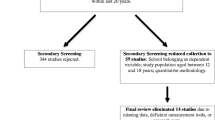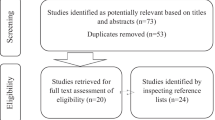Abstract
This mixed-methods study investigates the differences in demotivation between Chinese and Korean English teachers. A questionnaire on demotivation was conducted on 58 Chinese and 94 Korean in-service teachers to find out the dominant factors in teacher demotivation. Follow-up interviews with teachers were conducted to explore the reasons as to why teachers found the salient factors to be demotivating. The results indicated that the number of students per English classroom was the detrimental factor for both Chinese and Korean teachers. Moreover, the only factor that Chinese teachers perceived to be more demotivating than Korean teachers was the excessive interference or expectations of school parents. For Korean teachers, large amounts of administrative tasks and students’ lack of interest in English were found to be the most detrimental factors. From the findings of this study, practical implications as well as research suggestions are provided.
Similar content being viewed by others
Notes
In this paper, L2 is interchangeably used as referring to both second and foreign languages.
Snowball sampling is identified as “a few people who meet the criteria of the particular study and then asks these participants to identify further members of the population” (Dörnyei 2010, p. 61).
The class size in both countries is larger than the OECD average, which is 21 in elementary schools and 23 in junior high schools. In the average numbers of students, the numbers in decimal point were rounded up.
References
Aydin, S. (2012). Factors causing demotivation in EFL teaching process: A case study. The Qualitative Report, 17, 1–13.
Biggs, J. (1998). Learning from the Confucian heritage: So size doesn’t matter? International Journal of Educational Research, 29(8), 723–738.
Chambers, G. N. (1999). Motivating language learners. Clevedon: Multilingual Matters.
Day, C., Elliot, B., & Kington, A. (2005). Reform, standards and teacher identity: Challenges of sustaining commitment. Teaching and Teacher Education, 21(5), 563–577.
Dinham, S., & Scott, C. (2000). Moving into the third, outer domain of teacher satisfaction. Journal of Educational Administration, 38(4), 379–396.
Dörnyei, Z. (2007). Research methods in applied linguistics. Oxford: Oxford University Press.
Dörnyei, Z. (2010). Questionnaires in second language research: Construction, administration, and processing (2nd ed.). London: Routledge.
Dörnyei, Z., & Csizér, K. (1998). Ten commandments for motivating language learners: Results of an empirical study. Language Teaching Research, 2(3), 203–229.
Dörnyei, Z., & Ushioda, E. (2011). Teaching and researching motivation (2nd ed.). Harlow: Longman.
Hu, G.-W. (2003). English language teaching in China: Regional differences and contributing factors. Journal of Multilingual and Multicultural Development, 24(4), 290–318.
Ivankova, N. V., & Creswell, J. W. (2009). Mixed methods. In J. Heigham & R. A. Croker (Eds.), Qualitative research in applied linguistics: A practical introduction (pp. 135–161). Basingstoke: Palgrave Macmillan.
Jeong, Y.-S., Kim, S.-Y., Kim, E.-G., & Kim, M.-H. (2012). Estimating teachers’ appropriate workload based on job analysis. The Journal of Korean Teacher Education, 29(2), 397–420.
Jesus, S. N., & Lens, W. (2005). An integrated model for the study of teacher motivation. Applied Psychology: An International Review, 54(1), 119–134.
Johnson, C. R. (2001). Factors influencing motivation and de-motivation in Mexican EFL teachers. ERIC Document ED 459605.
Kassabgy, O., Boraie, D., & Schmidt, R. (2001). Values, rewards, and job satisfaction in ESL/EFL. In Z. Dörnyei & R. Schmidt (Eds.), Motivation and second language acquisition (pp. 213–237). Honolulu: University of Hawaii Press.
Kim, T.-Y., & Seo, H.-S. (2012). Elementary school students’ foreign language learning demotivation: A mixed methods study of Korean EFL context. The Asia-Pacific Education Researcher, 21(1), 160–171.
Kiziltepe, Z. (2008). Motivation and demotivation of university teachers. Teachers and Teaching: Theory and Practice, 14, 515–530.
Kwon, O. (2000). Korea’s English education policy changes in the 1990s: Innovations to gear the nation for the 21st century. English Teaching, 55(1), 47–91.
Lee, K. (2009). Exploring inservice teacher education in Korea. In Y. H. Choi & B. Spolsky (Eds.), English language teacher education in Asia (pp. 49–70). Seoul: Asia TEFL.
Li, P. (2009). Jiazhang “Guodu Ganyu Jiaoxue” Kunrao Hefei Jiaoshi. Excessive inference of student parents in teaching disturb the teachers of HeFei. JiangHai ChenBao. AnHui News. Retrieved January 25, 2013, from http://www.ah.xinhuanet.com/hfnews/2009-09/10/content_17660270.htm.
Marwan, A. (2009). Teachers’ workload and EFL teaching quality. Singapore Tertiary English Teachers Society (STETS) Language & Communication Review, 8(1), 31–35.
Ministry of Education of the People’s Republic of China. (2001). Jiaoyubu guanyu jiji tuijin xiaoxue kaishe yingyu kecheng de zhidao yijian. The Ministry of Education guideline for vigorously promoting the teaching of English in primary schools. Retrieved October 15, 2009, from http://www.moe.edu.cn/edoas/website18/level3.jsp?tablename=1162&infoid=727.
Ministry of Education, Science, and Technology. (2008). The school curriculum of the Republic of South Korea. Retrieved January 26, 2013, from http://cutis.mest.go.kr/APP/pds/list.jsp?gCd=S02&siteCmsCd=CM0001&topCmsCd=CM0003&cmsCd=CM0016&pnum=3&cnum=0&srcSort=&pageSize=10&sort1=&sort2=&src=tot&srcTemp=2007.
Nguyen, P. M., Terlouw, C., & Pilot, A. (2006). Culturally appropriate pedagogy: The case of group learning in a Confucian heritage culture context. Intercultural Education, 17(1), 1–19.
Organization for Economic Co-operation and Development (OECD). (2012). Education at a glance 2012: OECD indicators. Retrieved January 25, 2013, from http://www.oecd.org/.
Park, S.-H., & Lee, S.-K. (2012). A qualitative study of the burden of teachers in administrative affairs and policy agendas enhancing instructional abilities of teachers. The Journal of Korean Teacher Education, 29(1), 371–396.
Pennington, M. C. (1995). Work satisfaction, motivation and commitment in teaching English as a second language. ERIC Document ED 404850.
Pennington, M., & Riley, P. V. (1991). Measuring job satisfaction in ESL using the job descriptive index. Retrieved October 15, 2010, from http://www.docin.com/p-177654024.html.
Praver, M., & Oga-Baldwin, W. (2008). What motivates language teachers: Investigating work satisfaction and second language pedagogy. Retrieved October 15, 2010, from http://r-cube.ritsumei.ac.jp/bitstream/10367/222/1/Polyglossia14_What%20Motivates%20Language%20Teachers.pdf.
Rao, Z.-H. (2006). Understanding Chinese students’ use of language learning strategies from cultural and educational perspectives. Journal of Multilingual and Multicultural Development, 27(6), 491–508.
Seth, M. J. (2002). Education fever: Society, politics, and the pursuit of schooling in South Korea. Honolulu: University of Hawaii Press.
Shen, Y.-G. (2012). Guogao de Yali hui dui Jiaoshi de Gongzuo Yingxiang. The higher level of pressure will influence teachers’ work. Retrieved January 25, 2013, from http://qhpx.cersp.com/article/browse/420795.jspx.
Statistics Korea. (2012). Investigation of private education expenses. Retrieved January 25, 2013, from http://kostat.go.kr/survey/pedu/pedu_dl/1/index.board?bmode=read&aSeq=253726.
Strauss, A., & Corbin, J. (1998). Basics of qualitative research: Techniques and procedures for developing grounded theory (2nd ed.). Thousand Oaks: Sage.
Sugino, T. (2010a). Teacher demotivational factors in the Japanese language teaching context. Procedia: Social and Behavioral Sciences, 3, 216–226.
Sugino, T. (2010b). Teacher/students motivational/demotivational factors in a framework of SLA motivational research. Journal of National Defense Academy (Humanities and Social Sciences), 100, 1–16.
Wallace, M. (1991). Training foreign language teachers: A reflective approach. Cambridge: Cambridge University Press.
XinHua News. (2008). Shehui JiaZhang Yaoqiu Guogao, Xinli Pilao cheng Jiaoshi xin Zhiyebing. Excessive demand of society and student parents, psychological fatigue becomes a new occupational disease for teachers. Retrieved January 25, 2013, from http://www.edu.cn/jiao_yu_ren_cai_zi_xun_52/20080910/t20080910_324472.shtml.
Yeon, S.-M., & Kim, T.-Y. (2010). The influence of secondary school students’ perception about teachers in public and private education on their English learning motivation. English Language Teaching, 22(4), 185–209.
Yoo, H. (2002). Policy directions based on new for teacher education. The Journal of Korean Teacher Education, 19(3), 127–145.
Author information
Authors and Affiliations
Corresponding author
Rights and permissions
About this article
Cite this article
Kim, TY., Kim, YK. & Zhang, QM. Differences in Demotivation Between Chinese and Korean English Teachers: A Mixed-Methods Study. Asia-Pacific Edu Res 23, 299–310 (2014). https://doi.org/10.1007/s40299-013-0105-x
Published:
Issue Date:
DOI: https://doi.org/10.1007/s40299-013-0105-x




